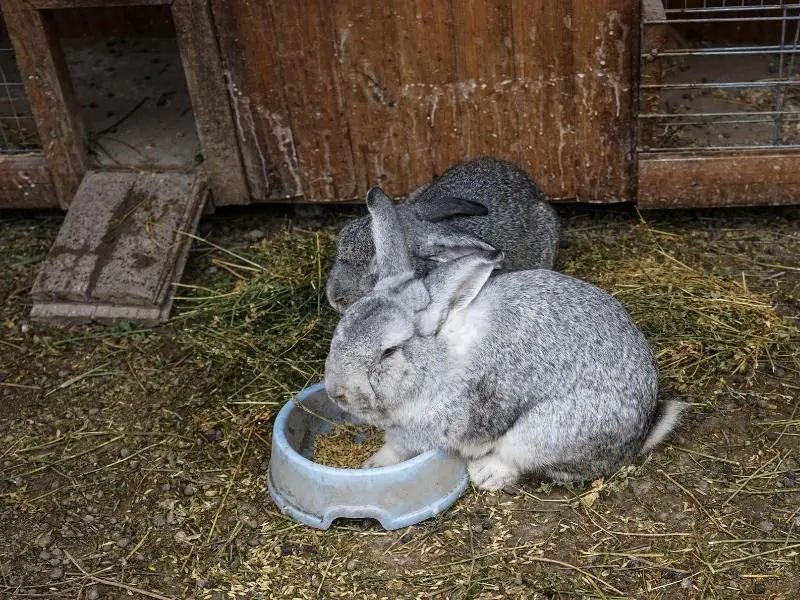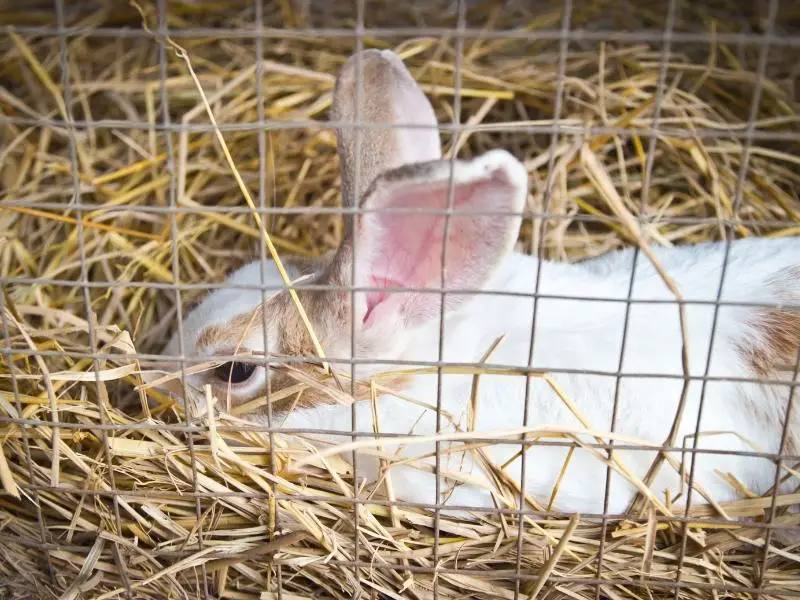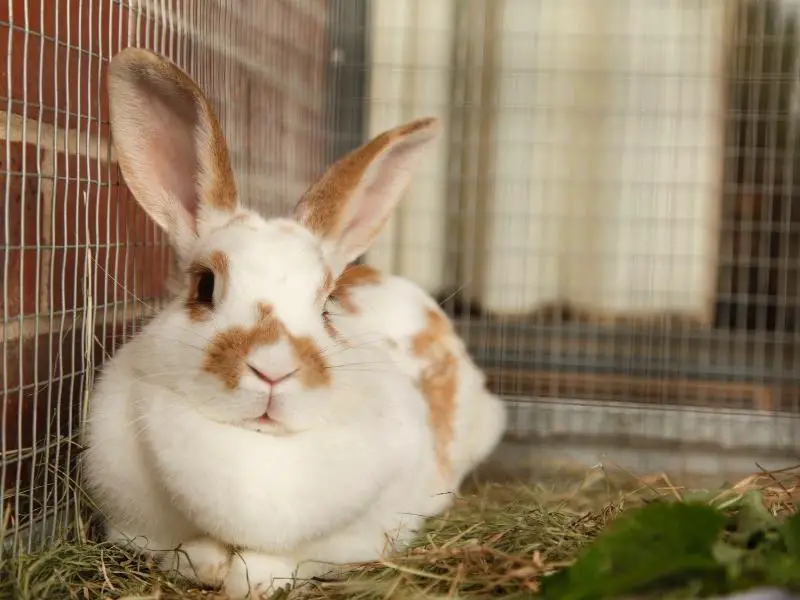Have you ever cleaned your bunny’s hutch or living space and noticed a white substance in the litter box instead of your bunny’s usual puddle of urine? You instantly assume the worst. Right?
So why is your furry friend’s urine white, and is there cause for concern?
Rabbits absorb all the calcium from their diet (unlike cats and dogs, which only absorb the amount their body needs). The excess calcium is then excreted through their urinary system, which appears as a white discharge, giving your bun’s urine a cloudy appearance (milky/white or chalky).
A rabbit’s pee isn’t always the normal color (slightly hazy), and some of these urine colors aren’t a reason to freak out and rush to the vet.
This guide will teach you everything you need to know about the various urine colors and what they mean for your floppy-eared friend.
Normal Rabbit Pee Color
Normal rabbit urine usually has a slightly hazy appearance (due to the presence of calcium and calcium carbonate) so it isn’t completely clear.
Your bun will pee about 2 to 8 times a day, and the color varies considerably from a golden yellow to an orange color during the day, depending on factors such as:
- Diet
- Hydration levels
- Stress levels
- Medication
Different Rabbit Pee Colors and What They Usually Mean

You shouldn’t ignore strange or different urine colors present in your fluffy friend’s litter box or hutch.
Let’s take a closer look at the colors of your rabbit’s urine and what they mean:
Transparent Pee
If your bun’s urine is transparent, it is considered normal.
But, if the urine color usually isn’t transparent, you should pay attention to your bun’s water intake.
If your bun is excessively drinking water, which will make the urine transparent, this might be a sign of kidney problems, and you should seek veterinary advice as soon as possible.
White Pee
An occasional white discharge is normal for your bun. The white color is excess calcium (that has not been absorbed) and has passed through your rabbit’s urinary system.
Your bun gets calcium from their diet and may take in too much calcium, resulting in the white ‘calcium’ urine.
Alfalfa hay is higher in calcium carbonate than hay such as Timothy hay or meadow hay. Adjusting your rabbit’s diet will improve the color of the urine.
If white urine is a regular occurrence for your bun, you can take them to the vet to check that there aren’t any underlying conditions.
Orange Pee
If your rabbit’s urine is orange in color, this may be a sign that your furry friend is dehydrated. Your rabbit’s urine will become more concentrated if they aren’t drinking enough water.
Always make sure your rabbit is drinking enough water. And in winter, check that your bun’s water hasn’t frozen.
Another thing to consider is your rabbit’s diet. If your furry friend had a helping of carrots on a particular day, you might notice that their urine is bright orange.
Yellow Pee
If your bunny’s pee is bright yellow, your bun is generally healthy and normal.
But milky yellow urine can be cause for concern, as this urine color is the first sign of calciuria (a syndrome related to the excessive consumption of calcium in the urinary tract of rabbits).
Brown Pee
If your pet bunny has brown pee, this can mean they are dehydrated. Encourage your bun to drink more water by flavoring the water with some herbs or a few slices of cucumber and strawberries
Brown pee can also be caused by pigments in your rabbit’s bladder (caused by diet and antibiotics).
Make sure your bun isn’t constipated. Rabbits can’t vomit, so the fecal matter will cause an intestinal blockage and build up in their system, which can turn urine brown.
Red Spots in Urine
If your rabbit has red spots in its urine, it can signify that there is blood present (haematuria).
Blood found in a rabbit’s urine is rare, and the red spots can also be caused by your bun’s food, as their diet may be too high in protein.
Red Pee
There is usually no need to be worried if your bunny has red urine. This color is generally due to plant pigments in your rabbit’s diet and rarely indicates health issues.
If your bunny’s pee is constantly red (bright or dark), it also isn’t a sign of blood in the urine.
Blood in urine appears more as splotches.
The main reasons your rabbit has red urine are due to:
- Antibiotics
- Cold weather
- Diet
Cloudy Pee
If your bun has cloudy or chalky pee, it’s a sign that they have a urinary tract infection or kidney stones. Cloudy urine is caused by excess calcium in your bun’s diet, and the pee can appear quite thick.
Your bun may show signs of discomfort when passing urine, and it is crucial to take your furry friend to the vet as soon as possible.
Different Rabbit Urinary Ailments

If your rabbit’s urinary habits seem off or out of the ordinary, they may have a urinary infection or ailment.
As your bun reaches middle age (between 3 and 5 years), they may become more susceptible to urinary problems.
Let’s look at a few of the different urinary ailments that are common in rabbits:
Kidney Stones
Your bunny can develop kidney stones (cystic calculi) because of calcium “sand” build-up in its urinary tract. This build-up of “sand” is deposited as sludge or calculi in the kidneys or bladder of your bun.
A few causes of kidney stones in rabbits are:
- Lack of exercise
- Kidney and bladder disease
- High calcium diet
- Not drinking enough water
- Bad genes
Rabbits can form stones in their kidneys, ureter, bladder, and urethra. There are a few signs that you should look out for:
- Urinating more than usual
- Peeing outside the litter box
- Unable to control their bladder and dribbling pee
- Difficulty peeing, or not peeing at all
- Sludge in the urine
- Urine scald (rash)
UTI (Urinary Tract Infection)
Urinary tract infections in rabbits are very common. Your bun’s bladder can become inflamed due to bacterial infection, which causes pain and discomfort when they urinate.
UTIs in rabbits are usually caused by bladder stones or sludge in the ureters, which causes a build-up of bacteria in the bladder.
A less common cause of a UTI is if your bun were to develop a cancerous growth, which causes trauma to the ureters.
Here are a few signs to look out for if you suspect your bun has a UTI:
- Thick sludge in the urine
- Hunched over in discomfort when urinating
- Urine scalding
- Not wanting to move around
- Grunts when urinating
- Trying to urinate frequently, with very little or no urine coming out
Calciuria
Male and female rabbits can develop calciuria because of the high calcium levels in their diets. A male bun can suffer from complete urinary obstruction because the penis has a narrower opening than the vulva of a female rabbit.
Calcium “sand” blocks the opening and causes severe pain for your bunny. Calciuria can be life-threatening for your fluffy friend. If left untreated, the bacteria caused by the “sand” can travel into the kidneys and lead to kidney damage or failure.
Watch out for the following signs:
- Lethargy
- Struggling to urinate
- Decrease in appetite
- Passing small amounts of urine
- Bloodstained urine
- Urine dribbling
Is Rabbit Pee Supposed to Smell Bad?
Your fluffy-eared friend has relatively high levels of ammonia in its pee. Unfortunately, this does create a strong smell, especially if the urine in the bun’s living quarters isn’t cleaned and is left to fester.
Rabbit pee smells similar to diluted ammonia (which isn’t very pleasant).
To control the strong smell of your bun’s urine, you can:
- Spay or neuter your bun
- Litter train your bun
- Clean the litter box at least once a day
- Line the litter box with hay
- Use an air filter
Is Rabbit Urine Harmful to Humans?
Luckily, your bun’s pee is perfectly safe to handle for most humans, but the smell of rabbit urine can be offensive.
However, there is a microorganism fungus called E. cuniculi that can be found in some rabbit urine. This bug doesn’t harm the rabbit, and their immune system fights the bug off and it leaves the rabbit’s body through its urine.
This bug can cause infections in people with immune-compromised systems, but this is extremely rare. It isn’t advised that a human with a compromised immune system (such as AIDS) handle rabbit urine.
My Last Bunny Thoughts
Urinary ailments can develop in your bun at any age, but they are more common in older rabbits. So keeping a close eye on your rabbit’s urinary habits and pee color is a great way to ensure your fluffy-eared friend is healthy and happy.
A great way to monitor your rabbit’s pee is to put white litter in your bunny’s litter box or lavatory area. As a result, your rabbit’s urine will stain the white litter, and it’ll be easier for you to determine the exact color of the urine and know whether to worry.
Related Articles:

